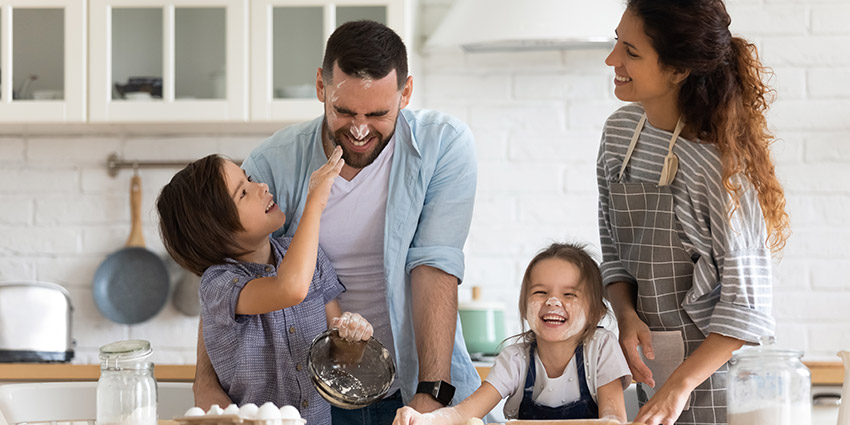You might not want to hear it, but your parents are responsible for the way you see and have sex. Well, at least partly. And there is so much more that comes to play than the dreaded sex talk we all had at one point or another. Before you go off gagging at two words, “parents” and “sex,” in the same sentence, hear us out – there is science behind it. Promise.
How Parents’ View of Sex Affects Kids
The way we feel about sex is not written in our DNA. What you like in the bedroom and what things about other people turn you on are not ingrained in your brain, nor does it come from your astrology chart. All of those things are learned the same way you learned to speak, walk, and know that if you touch fire, it’ll hurt.
We learn about courting, what’s appropriate, what’s good and bad during sex, and how we should feel about it from various sources – friends, media, books, and our environment at home. And the learning starts earlier than you think. You might believe that the view we have about sex forms when we’re teenagers and when the dreaded sex talk with parents happens. They’re embarrassed, so we’re embarrassed, and everyone is happy when it’s finally over.
But really, kids pick up subtle messages about what’s disgusting and allowed from way earlier than teenage years. Researchers have found that infants will avoid a toy if their adult caregiver looks at it with an expression of disgust. So, we start forming opinions about what’s right and wrong as early as infanthood.
In her book Come As You Are, Dr. Emily Nagoski gives the example of two identical twins separated at birth and raised in different environments and how different upbringings affect their relationship with their sexuality and sex. Both twins, Jessica and Theresa, are five or six and have a habit of masturbating during naptime. As toddlers, they don’t understand masturbation as adults do. They only know that when they touch themselves, it feels good. If you look at the common sexual behaviors in children, we can see that kids start exploring early. Way earlier than we imagine them to be even remotely interested in their sexuality.
Now, one day both of their adult caregivers walk in on the girls masturbating during naptime. Jessica’s caregiver reacts with involuntary disgust and says to her: “Stop that!” Now, Theresa’s caregiver has a very different reaction – instead of showing disgust, they calmly tell her that it’s time to get ready and leave the house.
So, how do these two different reactions affect the girls and their views on sex? “Jesicca’s brain learns to associate the shame and distress (brakes) communicated by her parent with whatever sexual arousal (accelerator) she was feeling at the moment her parents scolded her. Theresa’s brain, by contrast, learns no such association,” Dr. Nagoski explains in her book.
The view of what’s good and bad when it comes to sex for both girls started forming right that moment when their caregivers walked in on them and showed their reaction. While the parents might not think much of it, when the girls become teenagers and the dreaded sex talk time comes around when adults believe it is time to start teaching their kids values about sex, it’ll be too late. The girls already will have their views of sex formed inside their minds.
So, How Should Parents Treat Sex When it Comes to Their Kids?
Some parents believe that ignoring the topic of sex is the best way to raise kids who will behave responsibly when they’re adults and ready to have sex. Others believe in saying that sex is bad, hoping that it will deter the kids from ever engaging in the activity as teenagers.
My friend Olivia* was raised in a household where sex was not a topic of conversation. And the only time she would ever hear about it, it would be from her mom, who always reiterated that sex was for men and their pleasure only. The lack of sex-ed led Olivia to porn to learn about sex when she finally got a boyfriend at 15.
And what did she learn watching porn? Well, she learned that sex is indeed about pleasing a man. So, at 15 years old, when she had sex with her boyfriend for the first time, she did it the way the porn told her to have sex. And Olivia is not the only girl who had the same experience as a young adult.
The first place to start when it comes to raising sexually healthy and responsible kids is by looking at our views of sex and sexuality. Do you have reservations about sex and your sexuality? Do you experience shame and the need to hide that sex is a part of healthy adult life? Sorting out any negative feelings you have towards sex is crucial for healthy sex-ed.
You see, kids are excellent observers who mimic the behaviors they observe around them, especially when it comes to their parents, who are their primary teachers. And as we already discussed at the beginning, kids pick up the cues of what’s right and wrong from a very young age. So if, before you even have a sex talk with your kids, they grow up seeing and hearing that sex is taboo, they’ll have the same feelings towards sex when they grow up.
Social psychologist and sex researcher Dr. Justin Lehmiller suggests starting the conversation about sex with your kids as early as possible. “By starting when they’re young, you have a chance to ease into things and make sure your child has the information they need when they need it,” he explains.
Of course, if you start teaching your child about sex at the age of five, you can’t possibly explain all the intricate details that come with sex. So, Dr. Lehmiller also suggests breaking down the sex talk into age-appropriate topics and continuing talking about more complex things as the kids grow older.
This strategy is a surefire way to ensure that sex is not a shameful topic in your household. “Instead of letting the awkwardness continue to build by delaying it, you get to open the lines of communication early and get everyone used to talking about sex and the human body, which will make subsequent conversations on more complex subjects much easier,” Dr. Lehmiller further explains.
Of course, children don’t grow up in a vacuum. They go to schools and hang around with groups of other people who have different views than them, and they also consume media that might push harmful ideologies onto them. All of these things can affect the children and how they end up viewing sex as adults. However, if you create a safe space at home from an early age, where they can go for reassurance when they need it, the chances are that the children will grow up to have a healthier view towards sex than they would if they didn’t get the support from you as a parent.
*Name changed for privacy reasons

